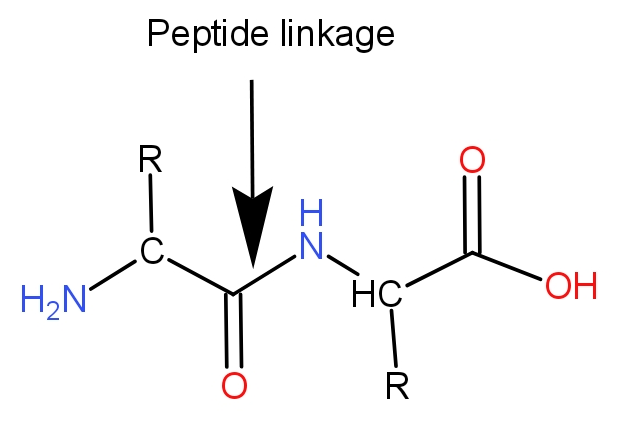
What is meant by
i.) peptide linkage
ii.) biocatalysts
Answer
593.1k+ views
Hint: Peptide linkage is a bond formed between two amino acids during protein formation.
Biocatalysts are the natural molecules which help in increase in rate of reaction.
Complete step by step answer:
Peptide linkage :- It is the name given to a chemical bond formed between C-N when proteins are formed from amino acids. When two molecules combine; the carboxyl group of one molecule reacts with the amino group of the other molecule resulting in formation of a molecule of water. It is a dehydration reaction. The reaction generally occurs between two amino acids.

This bond is covalent in nature. The monomers i.e. amino acids are joined forming a polymer which is protein.
Biocatalysts :- These are defined as the natural molecules that increase the rate of chemical reactions in the cells of living beings. These natural molecules can be enzymes or any other living small micro-organism or its part which performs chemical transformations on organic compounds in the organism. The enzymes are known as protein catalysts because they are majorly made up of proteins.
Biocatalysts provide several advantages over inorganic catalysts. The main one could be that these work in mild conditions. Thus, there are no chances of side reactions and are thus less harmful.
Note:
Peptide linkage is also a type of condensation reaction.
The formation of the peptide bond requires energy which is derived from ATP in living beings. The process is normally catalysed by enzymes which are known as peptidases or proteases. These enzymes are called biocatalysts.
The peptide bond is not so reactive because of resonance stabilization.
Biocatalysts are the natural molecules which help in increase in rate of reaction.
Complete step by step answer:
Peptide linkage :- It is the name given to a chemical bond formed between C-N when proteins are formed from amino acids. When two molecules combine; the carboxyl group of one molecule reacts with the amino group of the other molecule resulting in formation of a molecule of water. It is a dehydration reaction. The reaction generally occurs between two amino acids.

This bond is covalent in nature. The monomers i.e. amino acids are joined forming a polymer which is protein.
Biocatalysts :- These are defined as the natural molecules that increase the rate of chemical reactions in the cells of living beings. These natural molecules can be enzymes or any other living small micro-organism or its part which performs chemical transformations on organic compounds in the organism. The enzymes are known as protein catalysts because they are majorly made up of proteins.
Biocatalysts provide several advantages over inorganic catalysts. The main one could be that these work in mild conditions. Thus, there are no chances of side reactions and are thus less harmful.
Note:
Peptide linkage is also a type of condensation reaction.
The formation of the peptide bond requires energy which is derived from ATP in living beings. The process is normally catalysed by enzymes which are known as peptidases or proteases. These enzymes are called biocatalysts.
The peptide bond is not so reactive because of resonance stabilization.
Recently Updated Pages
Master Class 11 Computer Science: Engaging Questions & Answers for Success

Master Class 11 Business Studies: Engaging Questions & Answers for Success

Master Class 11 Economics: Engaging Questions & Answers for Success

Master Class 11 English: Engaging Questions & Answers for Success

Master Class 11 Maths: Engaging Questions & Answers for Success

Master Class 11 Biology: Engaging Questions & Answers for Success

Trending doubts
One Metric ton is equal to kg A 10000 B 1000 C 100 class 11 physics CBSE

There are 720 permutations of the digits 1 2 3 4 5 class 11 maths CBSE

Discuss the various forms of bacteria class 11 biology CBSE

Draw a diagram of a plant cell and label at least eight class 11 biology CBSE

State the laws of reflection of light

Explain zero factorial class 11 maths CBSE




